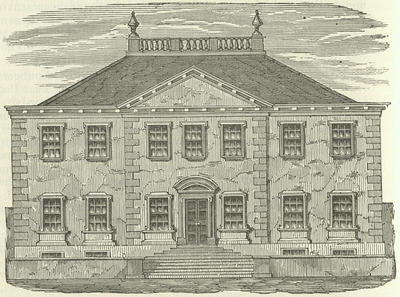Today I found out that during his retreat from England to Culloden, Bonnie Prince Charlie and his Jacobite army passed through Hamilton and Glasgow on their way to Falkirk.
This surprised me greatly because I don't think I've ever heard anything about a connection between 'The Young Pretender' and Glasgow. Yes, I am a shocking ignoramus!
Was Glasgow and it's surrounds pro-Jacobite? Was there a split for and against? Or were they very much unwanted visitors?
If anyone has anything interesting to say on the topic there will be at least one person interested.
Bonnie Prince Charlie in Glasgow
Moderators: John, Sharon, Fossil, Lucky Poet, crusty_bint, Jazza, dazza
10 posts
• Page 1 of 1
Re: Bonnie Prince Charlie in Glasgow
KonstantinL wrote:Today I found out that during his retreat from England to Culloden, Bonnie Prince Charlie and his Jacobite army passed through Hamilton and Glasgow on their way to Falkirk.
This surprised me greatly because I don't think I've ever heard anything about a connection between 'The Young Pretender' and Glasgow. Yes, I am a shocking ignoramus!
Was Glasgow and it's surrounds pro-Jacobite? Was there a split for and against? Or were they very much unwanted visitors?
If anyone has anything interesting to say on the topic there will be at least one person interested.
I would say unwanted visitors. There are many stories about this in the local histories I have read but I have a terrible memory. I will have a browse and post a few anecdotes later.
John
'It's a sad day for capitalism when a man can't fly a midget on a kite over Central Park'
- John
- -

- Posts: 5152
- Joined: Fri Aug 11, 2006 9:15 pm
Glasgow was most certainly not pro-Jacobite which may have been one of the reasons why Bonnie Prince Charlie seized the city for 10 days during his retreat in 1745, with the citizenry being forced to provide accommodation and provisioning for his army. He stayed in the Shawfield Mansion apparently. The provost at the time was Andrew Cochran who eventually managed to get an indemnification from Parliament for what it had cost the city to look after the rebels.
-

viceroy - Third Stripe

- Posts: 1048
- Joined: Sun Jan 30, 2005 8:23 pm
- Location: Glasgow no more
From "The Second City" by C.A. Oakley (who my wife once met many years ago)
"Even stronger action was taken against Bonnie Prince Charlie in the 1745 rebellion. Glasgow was against the young pretender. The Prince's Highland army descended on Glasgow during its retreat, and held the city in custody for ten days., the townspeople being forced to bear the cost of quartering and re-clothing."
Andrew Cochran was the Provost at the time and was called upon to deal with Bonnie Prince Charlie's seizure of the city and subsequently procured from parliament an indemnification.
According to my book he also stayed in the Shawfield mansion.
There are lots more anecdotes in Heart of Glasgow by Jack House which I don't have to hand at the moment.
John
"Even stronger action was taken against Bonnie Prince Charlie in the 1745 rebellion. Glasgow was against the young pretender. The Prince's Highland army descended on Glasgow during its retreat, and held the city in custody for ten days., the townspeople being forced to bear the cost of quartering and re-clothing."
Andrew Cochran was the Provost at the time and was called upon to deal with Bonnie Prince Charlie's seizure of the city and subsequently procured from parliament an indemnification.
According to my book he also stayed in the Shawfield mansion.
There are lots more anecdotes in Heart of Glasgow by Jack House which I don't have to hand at the moment.
John
'It's a sad day for capitalism when a man can't fly a midget on a kite over Central Park'
- John
- -

- Posts: 5152
- Joined: Fri Aug 11, 2006 9:15 pm
The Clyde here takes an abrupt bend at Peat-Bog point, and sweeps in a fine semi-circular curve round the low-lying Fleshers’ Haugh. It was on this spacious tree-dotted haugh or holm that Prince Charles Edward, the "young Chevalier" of Scottish song, reviewed his troops on the occasion of his unwelcome visit to Glasgow, in the winter of 1745-6. Among the Whigs of Glasgow the Chevalier had few friends. Accordingly, when returning from England he arrived at our city on his way to the Highlands, he determined to make the most of the wealthy enemy. The Highlanders, after their lengthened and bootless campaign, were in a most necessitous condition. Their tartans were nearly worn out, while many of them were without brogues, bonnets, or shirts. On their way to the city every individual they met was speedily divested of shoes and other articles of dress. Notwithstanding such wind-falls, they presented a most miserable appearance. But Glasgow "saw another sight" (and paid for it too) before their departure. Charles, without ceremony, at once took up his residence at the best house in the city, and adopted the necessary measures for refitting his army. The Magistrates were compelled to officiate as clothiers, to the tune of 12,000 shirts, 6,000 cloth coats, 6,000 pairs of shoes, 6,000 pairs of stockings, 6,000 waistcoats, and an equal number of bonnets. "My conscience!" what would Bailie Nicol Jarvie say to such an act of extortion? Whatever the honest Ballie may have said, the described articles had to be produced, and it was in the pride of these borrowed plumes that the review we have mentioned was held. "We marched out (says one of Charlie’s English followers, in a manuscript journal) with drums beating, colours flying, bagpipes playing, and all the marks of a triumphant army, to the appointed ground, attended by multitudes of people who had come from all parts to see us, and especially the ladies, who, though formerly much against us, were now changed by the sight of the Prince into the most enthusiastic loyalty." During the review Charles stood under a thorn-tree, on the declivity which forms the north-western boundary of the Fleshers’ Haugh, about 100 yards east of the "round seat." One of the citizens, then a boy, many years afterwards said, "I managed to get so near him that I could have touched him with my hand, and the impression which he made upon my mind shall never fade as long as I live. He had a princely aspect, and its interest was much heightened by the dejection which appeared in his pale fair countenance and downcast eye. He evidently wanted confidence in his cause, and seemed to have a melancholy foreboding of that disaster which soon after mined the hopes of his family for ever."
The Chevalier and his devoted Highlanders passed away. Their after fate, as every one knows, forms one of the darkest themes in Scottish story. In the contemplation of their subsequent misfortunes, their faults and failings are forgotten; and now that the unfortunate Chevalier’s name and memory have become "such stuff as dreams are made of," every heart thrills in sympathy with the pathetic lyrical expression of our townsman Glen,—
"Oh waes me for Prince Charlie!"
The old thorn, "Prince Charlie’s Tree," as it was called, continued to be pointed out until recently, when somehow or other it disappeared. Latterly it had a blasted and decaying appearance, and was protected by a wooden railing. We have heard it rumoured, whether truly or not we cannot say, that this venerable and interesting relic was destroyed some four or five years ago by a band of mischievous scoundrels during a Queen’s birth-day riot. We should not be surprised to learn, however, that some sacrilegious antiquary has the old stump snugly deposited among his "auld nick-nackets." As unlikely things have happened ere now among the disciples of Grose. if our friend Mr. Moir will forgive our apparent inconsistency, we would entreat him, when next he takes the planter’s spade in hand, to let us have a successor to the "Chevalier’s thorn." Such a spot should certainly not be permitted to remain unmarked.
To return to Charles. On his arrival at Glasgow, his first care was to provide for the necessities of his men, who were in a most pitiable plight from the want of clothing. He ordered the magistrates to furnish the army with 12,000 shirts, 6,000 cloth coats, 6,000 pairs of stockings, and 6,000 waistcoats. Enraged at the conduct of the citizens for having subscribed to the fund for raising troops against him, the prince sent for Buchanan the provost, and demanded the names of the subscribers, and threatened to hang him in case of refusal: but the provost, undismayed, replied that he would name nobody except himself, that he had subscribed largely, as he thought he was discharging a duty, and that he was not afraid to die in such a cause. The provost had to pay a fine of £500 as the penalty of his refusal.
The mansion which Charles occupied during his residence in Glasgow belonged to a rich merchant named Glassford. It was the best house in the city, and stood at the western extremity of the Trongate, but has long since disappeared. While in Glasgow he ate twice a-day in public. The table was spread in a small dining-room, at which he sat down without ceremony with a few of his officers in the Highland dress. He was waited upon on these occasions by a few Jacobite ladies. Charles courted popularity, and, to attract attention, dressed more elegantly in Glasgow than at any other place; but the citizens of Glasgow kept up a reserve, which made Charles remark, with a feeling of mortified disappointment, that he had never been in a place where he found fewer friends. Though dissatisfied with the people, he seemed, however, greatly to admire the regularity and beauty of the buildings.
-

HollowHorn - Third Stripe

- Posts: 8921
- Joined: Mon May 23, 2005 9:59 pm
- Location: Paisley
HollowHorn wrote:To return to Charles. On his arrival at Glasgow, his first care was to provide for the necessities of his men, who were in a most pitiable plight from the want of clothing. He ordered the magistrates to furnish the army with 12,000 shirts, 6,000 cloth coats, 6,000 pairs of stockings, and 6,000 waistcoats. Enraged at the conduct of the citizens for having subscribed to the fund for raising troops against him, the prince sent for Buchanan the provost, and demanded the names of the subscribers, and threatened to hang him in case of refusal: but the provost, undismayed, replied that he would name nobody except himself, that he had subscribed largely, as he thought he was discharging a duty, and that he was not afraid to die in such a cause. The provost had to pay a fine of £500 as the penalty of his refusal.
It would have been interesting to see if some of the more recent provosts would have been as honourable given the same choice.
-

scaryman2u - Third Stripe

- Posts: 959
- Joined: Sat Jun 24, 2006 2:22 pm
- Location: GLASGOW
10 posts
• Page 1 of 1
Return to Glasgow Chat (Coffee Lounge)
Who is online
Users browsing this forum: No registered users and 22 guests


